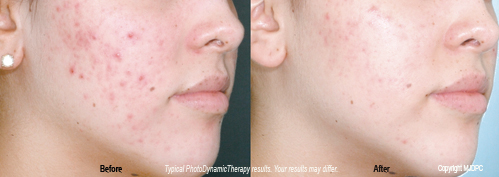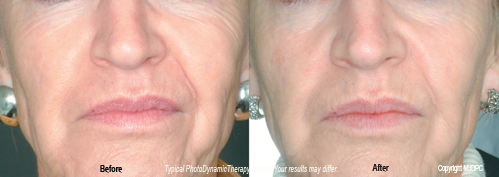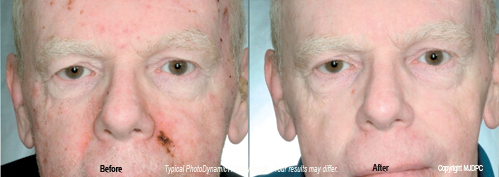Over time, the effects of the sun, wind, time and hormones begin to appear. Our skin is our body's largest organ and maintaining its youthful, vibrant appearance doesn't have to be a difficult process any longer.

The aging process
The first signs of aging are when fine lines begin to form around the eyes and lips. Then the collagen and elastin begins to wear out and deeper lines and grooves form in our brow, next to the nose and down to the corners of our mouths. Surface irregularities such as pigment discolorations and acne scarring may also occur.
Many patients wish that there was a safe, effective and quick way to get rid of their sun-damage, red complexion, fine wrinkles, irregular pigmentation and large pores. Other patients are troubled by persistent skin breakouts that do not respond to regular acne treatments. Fortunately, our advanced technologies enable us to treat these skin imperfections safely, easily and effectively with very little, if any, downtime.

PhotoDynamic Therapy (PDT)
PhotoDynamic Therapy is performed by our doctor for patients in our region, using a topical application of ALA, or Levulan® (aminolevulinic acid) to treat skin damage in a softer, gentler way. PhotoDynamic Therapy delivers specific wavelengths of intense light through very specific filters to the skin. Once delivered, the targeted tissue absorbs the light's energy. We use our advanced light systems and topical applications of ALA to restore a more youthful appearance to your skin by efficiently treating sun-damage, acne, pre-cancer and even some types of skin cancer.
Can PhotoDynamic Therapy treat acne?
Yes, PhotoDynamic Therapy kills the P. acnes bacteria in your skin which causes acne. The blue light can be administered alone or in conjunction with a topical application of ALA for the treatment of acne vulgaris. Pretreatment with topical ALA may offer additional reduction of lesions, pustules and papules.
What are the benefits of PhotoDynamic Therapy?
- Fewer treatments
- Minimal downtime
- Healthier-looking skin
- Smoother skin
- Reduced pore size
- Reduced brown spots
- Reduced acne breakouts
- More even skin tone
- Reduced wrinkle appearance
Are there any side effects with PhotoDynamic Therapy?
Side effects include sunburn-like reaction with redness and peeling for several days.
What results can I expect from PhotoDynamic Therapy?
After each session, you will experience some improvement in skin tone and texture. Sunspots will fade; pore sizes will shrink. Fine lines and wrinkles will gradually decrease in severity as the new collagen forms beneath the skin. Pre-cancers will be minimized, and the appearance of acne can be reduced. These improvements will continue to increase with each treatment.

What are PhotoDynamic treatments like?
PhotoDynamic treatments are spaced at 3 - 4 week intervals. The number of your treatments, your treatment time and your treatment intervals may vary depending on the condition being treated. You will receive a surface application of ALA solution prior to your treatment, which will be applied several minutes to several hours before the accompanying light treatment. PhotoDynamic therapy can cause mild to moderate stinging pain during treatments and mild to moderate redness, blistering and scabbing after treatment depending on how long the Levulan Kerastick is left on, how much light is used, and which light source is used to activate the ALA. Light sources include various lasers and different colors of light including blue, yellow and red. Your physician can help decide which is best for you.
What is recovery like from PhotoDynamic Therapy?
After our physician performs your PhotoDynamic Therapy treatment, there may be some discomfort or a sunburn like appearance. The skin may appear flushed and slightly swollen and brown spots may become darker. This will decrease over the next several days. You may resume normal activities immediately. However, patients must avoid all bright light sources and minimize direct sun exposure for 48 hours after treatment to lessen these reactions.